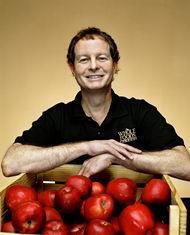
When Whole Foods Market (WFM) opens its flagship store in an 80,000 square foot former art deco department store on Kensington High Street in London, on June 6, it will be the largest food store in the city centre.
Since the US company’s acquisition of UK-based Fresh & Wild, a chain of seven natural and organic food stores, in January 2004, the retailer has been keen to expand the Whole Foods Market brand into the UK and eventually into other parts of Europe.
The company was established in 1980 and opened its first WFM store in Austin, Texas. Founders John Mackey and Peter Roberts embarked on the store with a mission to offer more natural and wholesome foods to those typically being sold in other stores.
Now, with nearly 200 stores in the US and Canada, in addition to the Fresh & Wild stores in the UK, WFM has, in some people’s minds, become much more than it was supposed to be and therefore can not hold itself to its original claims. The company has a “declaration of interdependence” where its motto - “Whole Foods, Whole People, Whole Planet” - sets out to prove that the company’s vision reaches far beyond just being a food retailer.
Aiming to offer the highest quality, least processed and naturally preserved foods, the company believes that food in its purest state is the best tasting and most nutritious food available. Also claiming to be committed to sustainable agriculture, WFM is highly selective about what it sells and dedicated to stringent quality standards.
It maintains that its success is measured by customer satisfaction, team member excellence and happiness, return in capital investment, improvement in the state of the environment, and local and larger community support.
However, it does not seem to be getting much support so far from the UK market. The UK’s close-knit organic community is not welcoming the new competition with open arms amid rumours that, because British organic standards are higher than those in the US, some UK organic farmers do not want to be associated with WFM at all.
But the heavyweight opposition has come from large retail multiples. Supermarkets have been cultivating their organic farm connections for years, and feel the threat of a large superstore claiming to be totally local and organic most keenly.
The WFM move has certainly ruffled a few feathers where the large supermarkets are concerned; with many retail multiples stepping up to the challenge with improvements to their own organic ranges. Tesco has already copyrighted the name ‘Wholefoods’ and launched its own range of food, so WFM will have to sell its own brand food as Fresh & Wild in the UK.
But is it a case of the UK market being too true to organic produce to take on this branding, or is it hitting a nerve that the UK’s retail multiples are making a brand out of organics?
It has been said that WFM will consider products within a 200-mile radius as local, and this has caused uproar, with the realisation of what happens when a company that claims to be on the ‘greener’ side expands at such an alarming rate.
Considering that London is surrounded by a wealth of markets and organic produce stores, and that Tesco has recently been criticised for stating that they considered 40-mile radius of the store to be local, this could be seen as quite a risky venture.
But when the company’s plans were first announced, John Mackey, WFM chairman and ceo, was very optimistic. “We are excited to extend the Whole Foods Market mission and brand beyond the US and Canadian borders and into Europe,” he said. “The UK is an obvious first choice due to the advanced acceptance of organic foods and lack of language barrier.”
This is the crux of problem, the British market, although it has an established organic industry, is a perfect place to bring good quality organic food because consumers tend to shop around for the right product, especially in wealthy Kensington.
WFM has outperformed all of the US’s traditional supermarket chains and generates twice the profit per sqft of any other US supermarket. The main fear from British supermarkets must be that, like they have done in the past, WFM will swallow them whole.
The US$5.6 billion (£2.85bn) company will be offering a pampered retail experience, against selling mediocre food at the lowest price. If this works, it has been predicted that a shift in the UK supermarket culture will be quick and drastic.
However, organics becoming a brand within this superstore causes unease, leading to critics believing that the store has become greedy and betrayed its original mission.
The fact that WFM, once a local organics store, is now filling its stores with produce from all over the world, while still claiming to be environmentally responsible, is behind the thinking that supermarket chains and sustainable natural food production just do not belong together. Again, this works against the supermarkets that advertise their organic ranges, as it highlights that they are following the same branding of the organic ideal.
Either way, the large store is going to mean bad news; it could either be a success, taking business away from supermarkets as more stores are added throughout the UK, or it could reveal how much the entire industry has betrayed the organic ideal.
Mackey will give a lecture just hours before the opening of the Kensington flagship store on his ethos of food production and retailing, from the importance of environmentally sensitive agriculture and ethical fair trading to locally produced and sourced food.
The Compassion in World Farming’s inaugural Peter Roberts Memorial lecture will take place at the Institution of Engineering and Technology in London on June 5, and will be followed by a question and answers session.